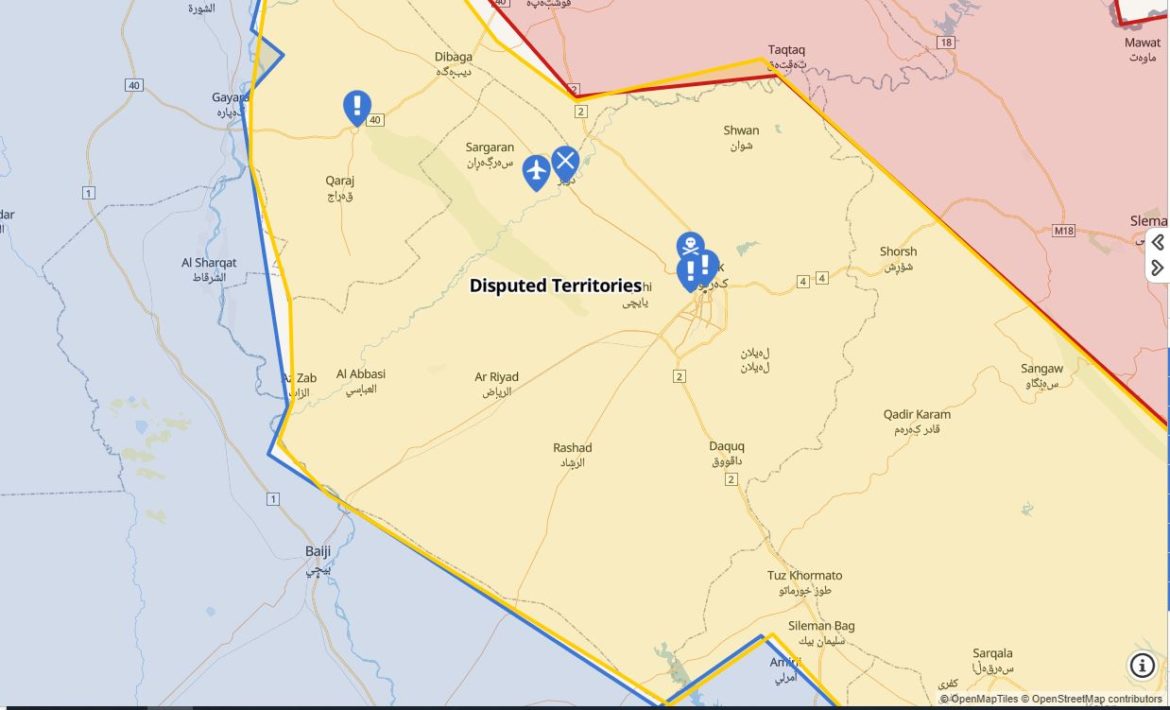1.1K
Kirkuk
- On December 14, the Iraqi National service raided the house of a Kurdish man named Abdul Qadir Sabah in the Shoraw neighborhood and arrested him. After hours of arrest, the security agency notified Sabah’s family to take his corpse back from the hospital. His death sparked a strong public reaction. The Iraqi National Security Service claimed that after the arrest, Sabah’s “health deteriorated on the way, and he was taken to hospital where he died.” Sabah was arrested on a complaint by an unknown person for comments on social media. After pressure from the Kurdish parties, the Interior Ministry formed an inquiry committee into the incident. On December 11, the same security agency arrested a Kurdish reporter of Wesha News Agency named Mohammed Wahab. He was charged with “defamation,” and after being in jail for three days, he was released on bail.
- Last week, five protests took place in Kirkuk, primarily by contracted employees demanding permanent hiring by the federal government. On December 11 and 15, contracted teachers and education lecturers demonstrated against the decision to deprive them of permanent employment. According to the demonstrators, the Kirkuk administration denied them to get hired in permanent positions from the education ministry’s new vacancies. Likewise, on December 13, contracted teachers and employees at Kirkuk University demonstrated, demanding permanent employment. According to the protesters, they have been deprived of all employee rights and privileges for eight years. On the second day of their demonstration, due to the lack of response from the university presidency, protestors set up tents and declared a general strike until their demands were implemented. Moreover, on December 14, contract employees of the Kirkuk municipality held a demonstration demanding the payment of their salaries, which have not been paid for six months. Lastly, On December 12, grocers in Khan Khurma market in Kirkuk demonstrated against an attempt by security forces to evacuate the market. The grocery stands’ owners accused the security forces of preventing them from entry to the market, obligating them to move to a new location which they have to pay to use the market.
- On December 14, several Arab settlers attempted to occupy 750 dunams (185 acres) of Kurdish lands in Mama and Alagheri villages in the Dibis district. In response, Kurdish farmers confront them. According to Kurdish farmers, the settlers had a court document to occupy the land. A similar attack occurred two weeks ago in the Daquq district, leading to a Kurdish farmer’s injury. Hundreds of thousands of agricultural lands owned by Kurds have been given to Arabs under the former Iraqi regime. The issue remains unresolved by the current Iraqi government despite constitutional articles calling for the normalization of the demographically changed areas.
- On December 11, the Turkish-backed Turkmen Front issued a press release demanding the post of Kirkuk police commander. The Iraqi Interior Ministry has appointed two Arab officers as deputy and assistant police commanders in Kirkuk, while a Kurd is the commander of the police forces. The Turkmen Front has accused the Iraqi Interior Ministry of neglecting the Turkmen community, saying the appointments in Kirkuk are contrary to the national balance and the Iraqi constitution, which specifies employment and positions only for the community. However, the Turkmen Front demanded to be given the only senior position Kurds have in the city—the police chief. The Kurds lost hundreds of senior security and administrative posts to Arabs and Turkmen since October 16, 2017.
- On December 14, Iraqi warplanes struck areas behind the Tanak neighborhood in the Dibis district, which is considered a hideout of terrorists. According to the Security Media Cell, two terrorists were killed in the bombing. In the city, on December 13, the Drug Enforcement Police arrested a drug trafficking group consisting of five people. According to a police statement, the gang was responsible for trafficking crystal meth, one of the most dangerous drugs poured into Iraq from Iran.
Khanaqin
- Diyala’s governor has reduced the electricity supply in Khanaqin to four hours a day. Meanwhile, 75 generators that supply electricity to neighborhoods were deprived of diesel because they did not have official licenses. In this context, the Khanaqin district administration called for urgent assistance from the Iraqi government to solve the electricity problem and also described the decisions of the governor of Diyala to punish the residents of the Khanaqin district.
- On December 15, the Khanaqin branch of the Turkish-backed Turkmen Front issued a statement calling for withdrawing the Peshmerga forces from the town and handing the entire security authorities to the federal government forces. The Turkmen Front’s request comes at a time of a dispute between the commander of Diyala operations and the Peshmerga forces over the number of Peshmerga forces in the region.
Makhmour
- The director of the Makhmour Police, Hani Sochi, sent a memorandum to the commander of Nineveh police, accusing a Kurdish man, commander of an anti-ISIS volunteer force, Faisel Sadiq of ties with the terror group. Faisal, a resident of Mount Qara Chokh who has a volunteer force from local villagers to fight ISIS (Da’esh), was also accused of ties to the Kurdistan Workers’ Party (PKK). Though the memorandum by the police director is months old, it was revealed on social media last week, sparking tensions in the area.

